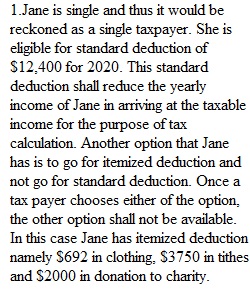


Q Module 2 Homework Please type your answers below the questions, number your responses appropriately. Completely answer the questions and demonstrate sound critical thinking in doing so. 1) It is April 14, 2021 and Jane is doing her taxes. Jane is single, 31 years old, and makes $111,467 per year. She has receipts totaling $692 in clothing she has donated, $3,750 in tithes to the church, and $2,000 in donations to charity. As far as she can tell, and she has been thorough, she has no other deductions to declare. Should Jane itemize her deductions or go with the standard deduction? Fully explain your answer, based on the standard deduction for 2020. 2) Ronnie has just received a bonus in his paycheck, which after taxes amounts to $2,336.73. Ronnie does not want to use this money to pay bills or spend frivolously. Instead, he wants to invest it. Ronnie is 27 years old and is planning to keep the money in the account he chooses until he turns 67 (he also identifies as being moderately risk averse). Ronnie is considering one of these three options... 1) Put the money in his credit union savings account at a 1.5% APR (compounded monthly). 2) Put the money in a CD that returns 2.75% interest compounded semi-annually, locking up his money for 10 years (he intends to reopen the CD at the same interest rate every 10 years). 3) Put the money into a Vanguard fund that emphasizes value stocks and returns an average of 4.6% growth per year (over the last 10 years, the fund has had two years in which there were negative returns). Which is the best option for Ronnie? Explain your rationale thoroughly. 3) Why is your credit score important? Thoroughly explain your position regarding the impact on personal finances (not necessarily your personal finances, but personal finances in general).4) Why should or should not a person buy stock? Be thorough in your answer, solidifying your position.
View Related Questions